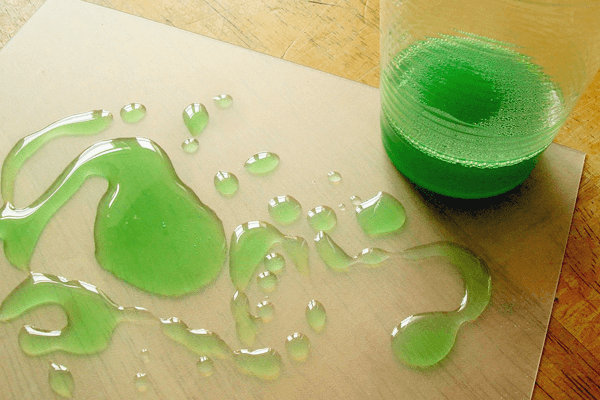Epoxy resin is a combination of epoxy and resin. Different solid materials that cannot be bonded with ordinary adhesives can also be effortlessly bonded with epoxy resin.
But while working on many important projects starting from DIY projects, we need some materials in which epoxy resin will not stick.
What material does epoxy resin not stick to?
There are many such materials that are non sticky to epoxy resin adhesives. In the meantime, I will mention a few materials and surfaces, with the help of which you can safely work with epoxy adhesive.

Contents
What Material Does Epoxy Resin Not Stick to?
Epoxy resin is very sticky and easy sticking adhesive.
I have mentioned a material list that does not stick to epoxy resin. Keep scrolling down to get the details.
- Teflon
- Polyethylene
- Silicone
- Polypropylene,
- Parchment or Wax Paper
- Mylar
- Vinyl Sheets or Surface
- Rubber
Teflon
You cannot attach epoxy resin to a material coated with Teflon. Teflon is a well-known substance for use as a waterproof coating. So if you are looking for an ideal material that doesn’t stick to epoxy resin, Teflon might be a good solution for you.
If I talk about the price, it is a little expensive compared to other materials available in the market. If it is not for a big project, I would recommend other elements to use.
Polyethylene
Polyethylene is what we know as Polythene. And this material is quite non-resiny. You can make molds with polyethylene plastic while doing your DIY project. You can also use it in different ways.
When you work on a surface that adheres to epoxy resin, you will need to cover the working area. For this purpose, Polyethylene or polythene can help you immensely. It is also cheap and available in almost every local shop.
Silicone
Here I come with the topmost used material in the DIY worlds of crafting projects. Silicone mold or container is hugely popular among artisans. Why is it so?
Artists and craftsmen love to use the Silicon mold due to its non-sticky texture to the epoxy resin. You can use it in various ways. This Silicone-based mold is still considered the best option starting from making jewelry crafts for home decor.
Polypropylene
Every person must have used polypropylene (PP) in his life. There is no pair of plastic containers made of polypropylene to keep dry food at home or store food in the fridge, starting with tiffin work.
The plastic box or container you use in every chore is polypropylene. The epoxy resins will not work on any material made of polypropylene.
Parchment or Wax Paper
It is straightforward to use Wax Paper because epoxy resin doesn’t work. Therefore, you can use this inexpensive material for your task where you require a material that doesn’t get glued with epoxy resin.
If you ask me for one of the cheapest materials that doesn’t adhere to epoxy resin, I will take the name of Wax Paper. Get it at the local shop or from the online shops.
Mylar
Mylar or BoPet is used in our daily lives. It is made in such a way that makes it durable. You might like this one for your DIY projects as it is non sticky to the epoxy resin. Moreover, Mylar Sheets or Mylar bags are effortless to use.
Fold it in every way you want. Mylar sheets and bags are available everywhere. Make the best use of it.
Vinyl Sheets or Surface
Generally, vinyl sheets are non sticky and waterproof. Their waterproof feature makes them one of the non-stick materials. You can not stick it to the vinyl floor using epoxy resin glue. But if you want a non-stick surface for your work, you can do it on a vinyl sheet-covered area.
Rubber
Today’s last pick is rubber. Yes, I would like you to know that epoxy resin doesn’t stick on rubber. If you plan to work with rubber using epoxy resin, it might upset you.
Though you can’t attach the rubber-based material to your work, rubber-based mold will give you a non-sticky surface to work on. It is even cheaper.
Is it Unsafe to Use Epoxy Resin for Gluing Purposes?
As we discuss epoxy resin, it is a must to talk about its safety issues. Many people have raised their concerns regarding this topic. So, today I brought this topic to this article.
Researchers have found it a little unhealthy. Especially if you are allergic or have any other sensitive disease, it is better not to use epoxy resin directly. You can wear a mask if you are bound to work with it.
Epoxy resin materials are not suitable as food containers or food serving plates. But I can’t claim it as a toxic material. So, if you are maintaining the precautions, It is safe to use epoxy resin in your projects.
What You’ve Been Missing
Is Epoxy Resin Flammable
What to Do If Epoxy Doesn’t Harden
How to Get Rid of Epoxy Resin Smell
Frequently Asked Questions
What can I use for epoxy resin mold?
The epoxy mold must be non sticky to the epoxy; otherwise, it would be an incredible mess. So you can choose materials that are not sticky to epoxy. For example, resin casting molds, plastic sheeting, silicone mold, tuck tape, silicone rubber.
What is an epoxy resin used for?
Epoxy resin hardener or liquid resin is the king of adhesive substances as the epoxy resin sticks easily. Nowadays, epoxy glue is the best solution for filling the slight cracks or making any crafts. Cured epoxy resin bring a beautiful glaze to your craft
Are plastics and rubbers the same?
Many people think that plastic and rubbers are formatted using the same substances where they are not. They have many differences. Rubbers are more eco-friendly than Plastic.
Conclusion
You must have learned what materials would be the best choices for you when trying to find something non-sticky to the epoxy resin. So, choose among them according to your needs and types of crafts and enjoy your work of resin art.
Happy Crafting!
